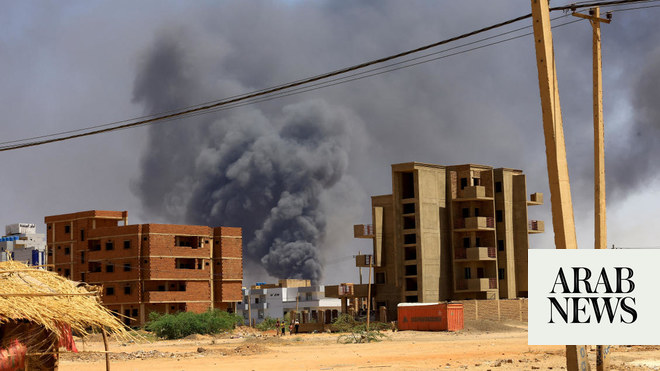
WAD/MADANI, Sudan/CAIRO: A drone attack Sunday on an open market south of Sudan’s capital, Khartoum, killed at least 46 people in one of the deadliest single attacks in Sudan’s nearly five months of war.
More than 55 others were wounded in the attack in Khartoum’s May neighborhood, where paramilitary forces battling the military were heavily deployed, activists and a medical group said.
The casualties in Sunday’s “Qouro market massacre” were taken to Bashair University Hospital, the Sudan Doctors’ Union said in a statement. The hospital had issued an “urgent appeal” for all medical professionals in the area to come and help treat the “increasing number of injured people arriving.”
The Resistance Committees, an activist group that helps organize humanitarian assistance, posted footage on social media showing bodies wrapped in white sheets in an open yard at the hospital.
The bombing in the south of Sudan’s capital came about a week after another air strike, also in southern Khartoum, killed 20 civilians on September 2, according to activists.
A conservative estimate from the Armed Conflict Location & Event Data Project says nearly 7,500 people have been killed in the war that began on April 15 between army chief Abdel Fattah Al-Burhan and his former deputy, Mohamed Hamdan Daglo, who commands the paramilitary Rapid Support Forces (RSF).
In early July an air strike on a residential area of Omdurman, Khartoum’s sister city, killed around two dozen people and drew condemnation from the United Nations.
The RSF blamed the military’s air force for Sunday’s attack, though it was not immediately possible to independently verify the claim.
The armed forces described the RSF accusations as “false and misleading claims,” denying that it attacked the market. It said it “directs its strikes against rebel gatherings, crowds and bases as legitimate military targets, and fully adheres to international humanitarian law.”
In addition to the capital, fighting has been mainly been concentrated in the western region of Darfur.
Indiscriminate shelling and airstrikes by both factions are not uncommon in Sudan’s war, which has made the Greater Khartoum area a battleground.
The armed forces control the skies over Khartoum, while RSF fighters continue to dominate the city’s streets.
The army has been accused of repeated indiscriminate shelling of the residential areas where the paramilitaries have embedded themselves, including by evicting families and taking over homes.
Positioning themselves in civilian occupied neighborhoods and buildings is “a potential violation of the Geneva Conventions,” the US-supported Sudan Conflict Observatory has said.
It added that the Sudanese Armed Forces “would still be required to ensure that civilian harm is minimized regardless of whether a target has been made a legitimate military target.”
The conflict has since spread to several parts of the country. In the Greater Khartoum area, which includes the cities of Khartoum, Omdurman and Bahri, RSF troops have commandeered civilian homes and turned them into operational bases. The military responded by bombing these residential areas, rights groups and activists say.
Western countries have accused the RSF and allied militias of killings based on ethnicity in Darfur, and the International Criminal Court has opened a new probe into alleged war crimes.
In the western Darfur region — the scene of a genocidal campaign in the early 2000s — the conflict has morphed into ethnic violence, with the RSF and allied Arab militias attacking ethnic African groups, according to rights groups and the United Nations.
Fierce clashes ensued over the weekend in Al-Fasher, the provincial capital of North Darfur province, following an attack on a military facility by the RSF, local media reported.
Clementine Nkweta-Salami, the UN humanitarian coordinator in Sudan, expressed concerns Sunday about the clashes in Al-Fasher. Writing on X, formerly known as Twitter, the UN official called for warring factions to stop fighting “so that humanitarians can bring in food, medicine and shelter items to those who need them most.”
The war has killed more than 4,000 people, according to August figures from the United Nations. However, the real toll is almost certainly much higher, doctors and activists say.
The number of internally displaced persons has nearly doubled since mid-April to reach at least 7.1 million people, according to the UN refugee agency. Another 1.1 million are refugees in neighboring countries, according to figures released last week by the International Organization for Migration.
Chad received about 465,000 refugees, mostly from West Darfur province where the RSF and its Arab militias launched scorched-earth attacks on non-Arab tribes in the provincial capital of Geneina and its surrounding areas, according to the UN and rights groups.
UN data show that around 2.8 million people have fled the Sudanese capital, whose pre-war population was around five million.
Those who cannot or refuse to leave Khartoum remain trapped by air strikes, artillery fire and street battles, forced to ration precious water and electricity.
After months of combat, neither side has been able to seize a decisive advantage.
Recent moves by Burhan, including trips to Egypt, South Sudan and Qatar, signalled a potential return to diplomacy, though both he and Daglo continue to trade hostile statements.
This post was originally published on this site be sure to check out more of their content.








